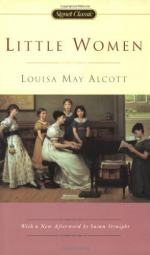It was a pictorial sheet, and Jo examined the work of art nearest her, idly wondering what fortuitous concatenation of circumstances needed the melodramatic illustration of an Indian in full war costume, tumbling over a precipice with a wolf at his throat, while two infuriated young gentlemen, with unnaturally small feet and big eyes, were stabbing each other close by, and a disheveled female was flying away in the background with her mouth wide open. Pausing to turn a page, the lad saw her looking and, with boyish good nature offered half his paper, saying bluntly, “want to read it? That’s a first-rate story.”
Jo accepted it with a smile, for she had never outgrown her liking for lads, and soon found herself involved in the usual labyrinth of love, mystery, and murder, for the story belonged to that class of light literature in which the passions have a holiday, and when the author’s invention fails, a grand catastrophe clears the stage of one half the dramatis personae, leaving the other half to exult over their downfall.
“Prime, isn’t it?” asked the boy, as her eye went down the last paragraph of her portion.
“I think you and I could do as well as that if we tried,” returned Jo, amused at his admiration of the trash.
“I should think I was a pretty lucky chap if I could. She makes a good living out of such stories, they say.” and he pointed to the name of Mrs. S.L.A.N.G. Northbury, under the title of the tale.
“Do you know her?” asked Jo, with sudden interest.
“No, but I read all her pieces, and I know a fellow who works in the office where this paper is printed.”
“Do you say she makes a good living out of stories like this?” and Jo looked more respectfully at the agitated group and thickly sprinkled exclamation points that adorned the page.
“Guess she does! She knows just what folks like, and gets paid well for writing it.”
Here the lecture began, but Jo heard very little of it, for while Professor Sands was prosing away about Belzoni, Cheops, scarabei, and hieroglyphics, she was covertly taking down the address of the paper, and boldly resolving to try for the hundred-dollar prize offered in its columns for a sensational story. By the time the lecture ended and the audience awoke, she had built up a splendid fortune for herself (not the first founded on paper), and was already deep in the concoction of her story, being unable to decide whether the duel should come before the elopement or after the murder.
She said nothing of her plan at home, but fell to work next day, much to the disquiet of her mother, who always looked a little anxious when ‘genius took to burning’. Jo had never tried this style before, contenting herself with very mild romances for The Spread Eagle. Her experience and miscellaneous reading were of service now, for they gave her some idea of dramatic effect, and supplied plot, language, and costumes. Her story was




